“I’m Leora, I’m Andrea Saacks’ younger sister. Andrea is 2 years older than me; she has Prader-Willi syndrome, and we live in Philadelphia. I live about half an hour from where Andrea lives in her group home,” said Leora Saacks, sister to Andrea, 52, living with PWS.
Though Leora has older children and a busy life, she and Andrea have a close and active relationship.
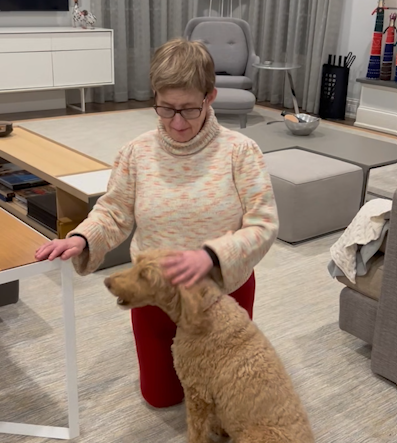
“She’ll come over for dinner and occasionally we’ll meet for an outing to a park or go get coffee. Mostly, she likes to come to our house and loves to play with my dog. I have older teenage daughters, she loves to see them, and more than seeing each other every few weeks, we check in on the phone very frequently. Andrea likes to be in touch.”
Leora and her sister grew up in South Africa when the world knew very little about PWS. This lack of knowledge added to the challenges that PWS can bring. But, as many families do, they found ways to work around some of the obstacles.
“We grew up in the same house together until I think she was about 12 years old and for as long as I can remember, I always knew that she was different. When we were really young, I think we still played together, but I do have recollections of her having outbursts, of having tantrums, of sometimes being very difficult to be around,” said Leora. “I do remember we had a pool at our house. She loved to swim; she loved to be in the pool. We had a little dog that she loved too. So I do remember being in the pool with her, and I remember playing with the dog with her.”
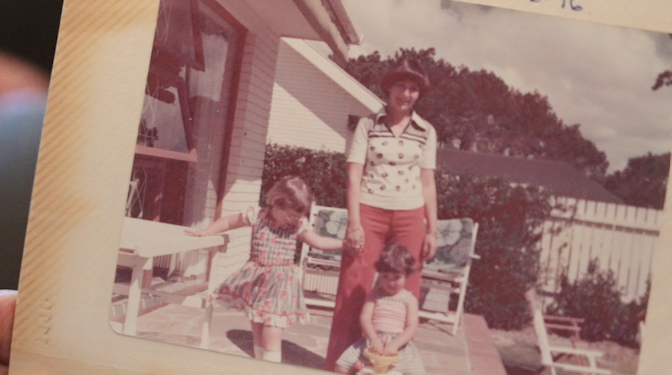
Leora spoke openly about the complications of their relationship. She offers her perspective and advice on maintaining the sibling relationship.
“At some point, you have a choice for what you want your relationship to be. I think it’s hard when you’re managing your own kids or when you’re helping with your parents and you don’t have your sibling to help with your parents. You can easily say, ‘I don’t have the capacity for this,’ or ‘I don’t have time for this,’ or you can say, ‘it’s just part of my life and it’s part of my world,’ and I have no judgment. I think that it’s really hard. I’m sure there are times when siblings assess what they can take on and what they can’t in their lives. I wish there were other ways to say it but it’s hard.”
Like many families, Leora says hers has greatly benefitted from PWSA | USA – the family support, resources, advocacy, and all we offer our community.
“I think the Prader-Willi Syndrome Association is phenomenal. It’s literally been a lifesaver for my family. I think having resources and people who really understand what the needs of a Prader-Willi person and the needs of a Prader-Willi family are has been invaluable,” said Leora. “Having an organization that truly gets it, that truly wants to be available, that really wants to help, and that wants to connect people has been very valuable.”
Stacy Ward, CEO OF PWSA, has worked with the PWS community for more than 20 years. Her experience, knowledge, and love for the individuals she meets with PWS has greatly benefitted so many families, including Leora’s.
“For Andrea, we’ve had a lot of challenges with her group home, and there have been some really tricky moments of communicating between the family and the group home. Quite honestly, there has not been a sufficient amount of trust, and just a difficult relationship. Stacy has been incredibly helpful in joining our conversations, joining our meetings – in many ways acting like a mediator who can both advocate for Andrea with an unbelievable amount of expertise but also have the respect of the group homes, knowing that Stacy is just someone who is looking out for the best interest of everyone involved. Having her presence, her actual time and thoughtfulness with us in the room and on the phone calls has been unbelievably helpful.”
Sharon Saacks, Andrea and Leora’s mother, recalls what times were like for her family back when Andrea was born with a diagnosis that very few had even heard of.
“When Andrea was born, we knew there was a problem almost immediately. She was small for dates, even though there was a question about if I was accurate with my date or there was a problem with the baby. She immediately went into an incubator in the NICU and she was presented with all the classic features that were present in PWs way back when,” said Sharon.
Determining a diagnosis for Andrea was neither easy nor quick for Sharon’s family.
“Although we knew that she had a problem, we did not have a diagnosis. She was seen by a variety of specialists in South Africa and nobody could make a diagnosis, except for one doctor who gave her a completely different diagnosis,” said Sharon. “My late husband was a physician and we moved to London. He got a job doing pediatrics and by coincidence, his boss was also South African. We asked him to look at Andrea and he immediately made the diagnosis, purely on clinical features. There was no other way of diagnosing PWS at that time.”
Receiving a diagnosis was not a very productive step in the beginning. There was such a lack of information that having the diagnosis meant little. There were few who knew how to educate or support families on appropriate services and lifestyle changes.
“When we received the diagnosis, we tried to do as much research as we could and there was really very little out because it was only discovered or written about in 1956 and Andrea was born at the end of 1971. When the doctor in London made the diagnosis, I said, ‘you know, how do I treat this?’ And he said, ‘I don’t know.’ He said, ‘just feed her and if she gains weight then don’t feed her so much.’ In terms of food, we had no idea how to feed her or what not to feed her. It really was a case of the blind leading the blind,” said Sharon.
She also recalls the challenges of their early life and its affect on Leora.
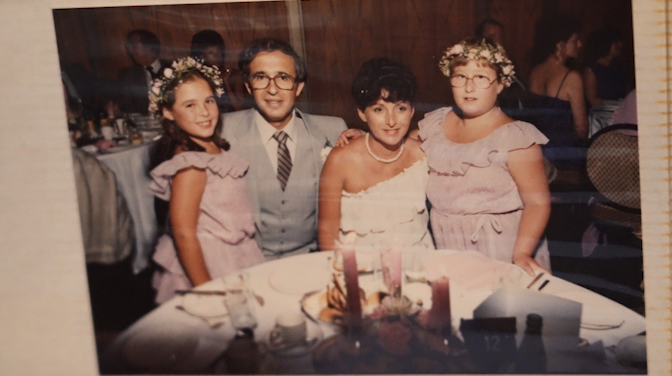
“I think the hardest thing was not knowing how to handle all the different variations of PWS. Trying to treat two siblings, two daughters, as equal was very difficult because if there was food lying around, Andrea would just eat anything and everything in sight. That was very difficult for us as a family and very hard for Leora as the younger sibling who had to take on a responsible role at a very early age.”
Eventually, the lack of appropriate services and challenges of PWS made it difficult for the Saacks family to manage safely. Their family was growing, and Andrea’s behaviors were becoming harder to handle. Sharon says they had some serious and hard decisions to make.
“Andrea’s behaviors, like all PWs, developed as she got a little bit older, and her tantrums were insufferable at times. So, we made the difficult decision of putting her into a boarding school for children with physical special needs,” said Sharon. “We then made the decision to immigrate for two reasons: 1. Politically, South Africa was going through a bad time and, 2. There were no facilities for Andrea whatsoever or PWs for that matter. I became a resource for some of the doctors, and again, it was a case of the blind leading the blind. When we immigrated, I knew I could not cope with the two other children, my husband who had to repeat a residency, and bring Andrea. So, we left her in the boarding school for the year and then my mom brought her over. From my perspective, it was the only way I could cope, but from Andrea’s perspective, it was a disaster. But if you ask me if I would do it the same way again, I would say yes.”
There may have been little information about PWS, but, as is still true today, parents were inspired and motivated to find ways to support each other. From this motivation, PWSA | USA was born.
“My husband and I found out about PWSA | USA in the early 70s, probably 1975, and there was a core group of parents who kind of banded together and formed the PW Association and started the magazine, the Gathered View. We used to get the magazine in South Africa, and this was kind of my lifeline,” said Sharon. “I really do feel the association does an amazing job of putting out information, funding research, and being incredibly supportive. I’ve had the wonderful experience of working with Stacy Ward more recently. She’s been so supportive and a real lifeline for what is a very difficult situation.”
Sharon understands the need for advocating and speaking up for the support our families need. PWSA | USA strives to be a solid voice for the PWS community in advocacy, family support, and research.
“I know that the PWS community advocates extensively and very proactively, both at the federal and state levels. I don’t know how much more one can do because there’s not enough money to go around for everybody, and I think that’s part of the problem. It’s kind of tragic. And unless we advocate loudly, we won’t get the money and the services that we really do need as a community.”
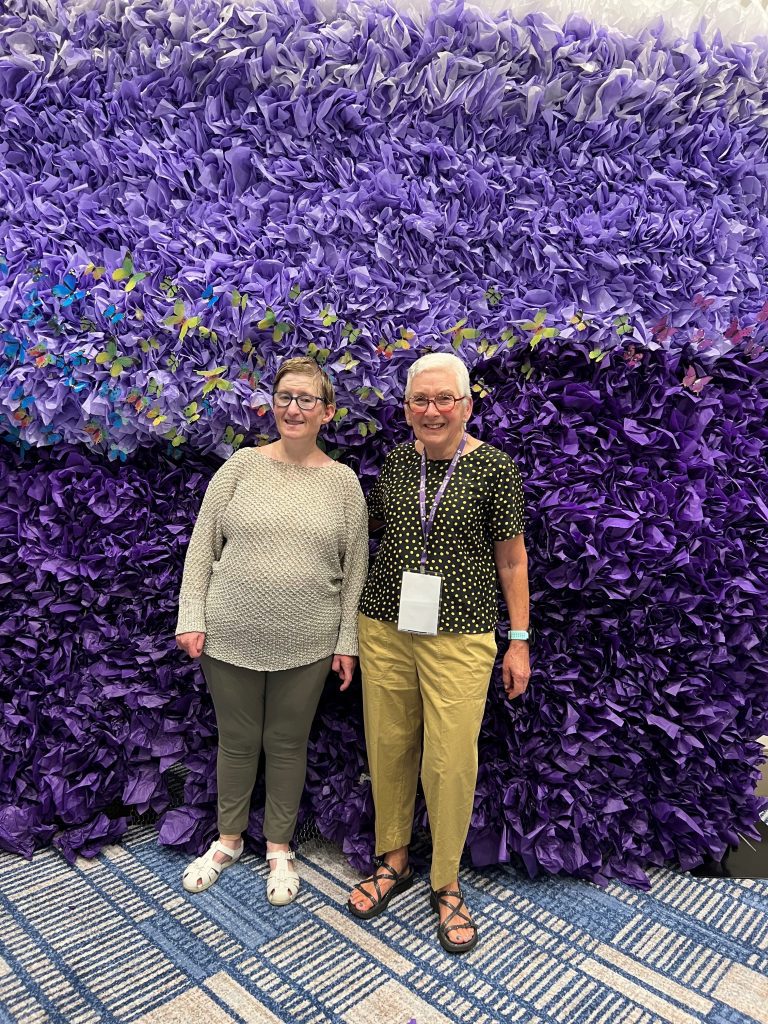
Sharon gave insights about her experience at the 2023 National Convention, which she says offered her an opportunity to connect with new families and hear their stories.
“When I was at this past conference, I spent time getting to know younger families, as much as one could in a short span of time. My heart went out to them because they don’t know that the road they’re going to have to travel is going to look like moving forward. But my journey was different because back then there was no knowledge whatsoever. We had no idea.”
Thankfully, with the help of organizations like PWSA | USA, motivated parents, inspired doctors and researchers, and the global communication we now have access to, families worldwide are gaining access to knowledge and resources on PWS, offering our loved ones and their families an easier path to travel.
You can support families affected by PWS, like the Saacks family, by making a donation to the 2023 Angel Drive campaign: https://www.pwsausa.org/angeldrive2023/
Share this!

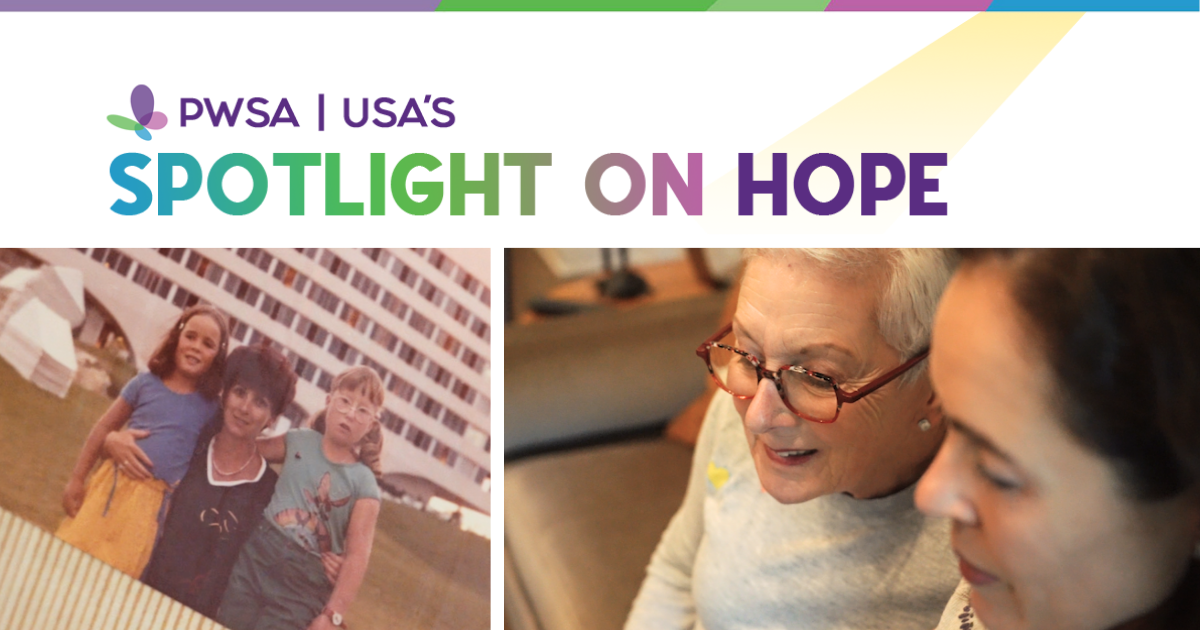
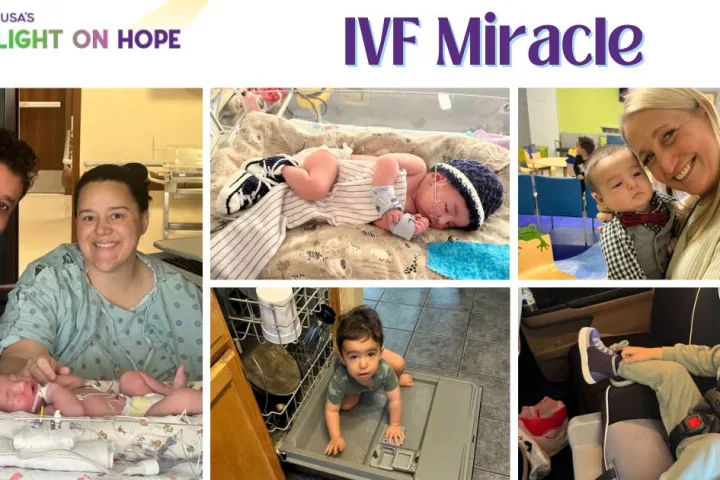
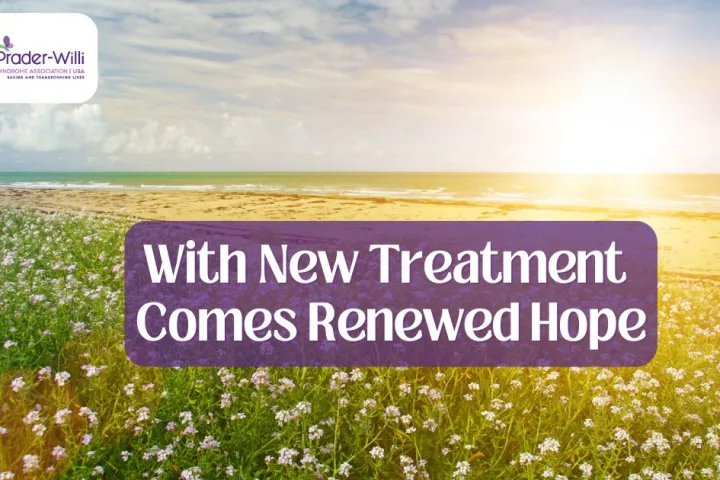

 Jennifer Bolander has been serving as a Special Education Specialist for PWSA (USA) since October of 2015. She is a graduate of John Carroll University and lives in Ohio with her husband Brad and daughters Kate (17), and Sophia (13) who was born with PWS.
Jennifer Bolander has been serving as a Special Education Specialist for PWSA (USA) since October of 2015. She is a graduate of John Carroll University and lives in Ohio with her husband Brad and daughters Kate (17), and Sophia (13) who was born with PWS. Perry A. Zirkel has written more than 1,500 publications on various aspects of school law, with an emphasis on legal issues in special education. He writes a regular column for NAESP’s Principal magazine and NASP’s Communiqué newsletter, and he did so previously for Phi Delta Kappan and Teaching Exceptional Children.
Perry A. Zirkel has written more than 1,500 publications on various aspects of school law, with an emphasis on legal issues in special education. He writes a regular column for NAESP’s Principal magazine and NASP’s Communiqué newsletter, and he did so previously for Phi Delta Kappan and Teaching Exceptional Children. Evan has worked with the Prader-Willi Syndrome Association (USA) since 2007 primarily as a Crisis Intervention and Family Support Counselor. Evans works with parents and schools to foster strong collaborative relationships and appropriate educational environments for students with PWS.
Evan has worked with the Prader-Willi Syndrome Association (USA) since 2007 primarily as a Crisis Intervention and Family Support Counselor. Evans works with parents and schools to foster strong collaborative relationships and appropriate educational environments for students with PWS. Dr. Amy McTighe is the PWS Program Manager and Inpatient Teacher at the Center for Prader-Willi Syndrome at the Children’s Institute of Pittsburgh. She graduated from Duquesne University receiving her Bachelor’s and Master’s degree in Education with a focus on elementary education, special education, and language arts.
Dr. Amy McTighe is the PWS Program Manager and Inpatient Teacher at the Center for Prader-Willi Syndrome at the Children’s Institute of Pittsburgh. She graduated from Duquesne University receiving her Bachelor’s and Master’s degree in Education with a focus on elementary education, special education, and language arts. Staci Zimmerman works for Prader-Willi Syndrome Association of Colorado as an Individualized Education Program (IEP) consultant. Staci collaborates with the PWS multi-disciplinary clinic at the Children’s Hospital in Denver supporting families and school districts around the United States with their child’s Individual Educational Plan.
Staci Zimmerman works for Prader-Willi Syndrome Association of Colorado as an Individualized Education Program (IEP) consultant. Staci collaborates with the PWS multi-disciplinary clinic at the Children’s Hospital in Denver supporting families and school districts around the United States with their child’s Individual Educational Plan. Founded in 2001, SDLC is a non-profit legal services organization dedicated to protecting and advancing the legal rights of people with disabilities throughout the South. It partners with the Southern Poverty Law Center, Protection and Advocacy (P&A) programs, Legal Services Corporations (LSC) and disability organizations on major, systemic disability rights issues involving the Individuals with Disabilities Education Act (IDEA), Americans with Disabilities Act (ADA), and the federal Medicaid Act. Recently in November 2014, Jim retired.
Founded in 2001, SDLC is a non-profit legal services organization dedicated to protecting and advancing the legal rights of people with disabilities throughout the South. It partners with the Southern Poverty Law Center, Protection and Advocacy (P&A) programs, Legal Services Corporations (LSC) and disability organizations on major, systemic disability rights issues involving the Individuals with Disabilities Education Act (IDEA), Americans with Disabilities Act (ADA), and the federal Medicaid Act. Recently in November 2014, Jim retired.